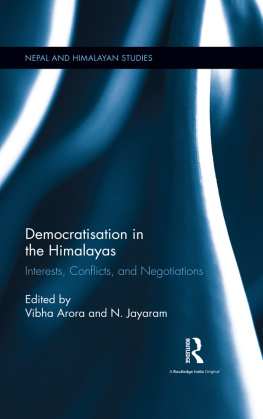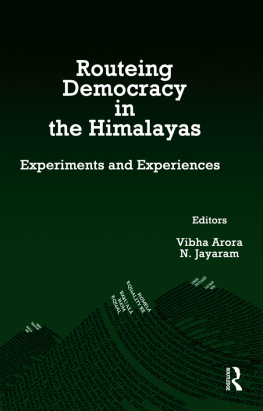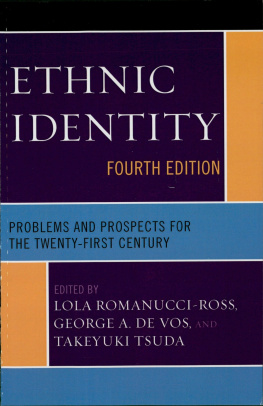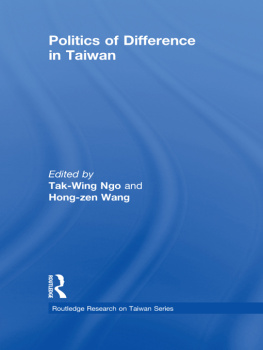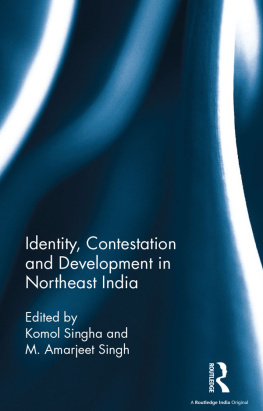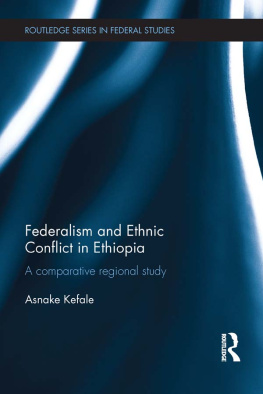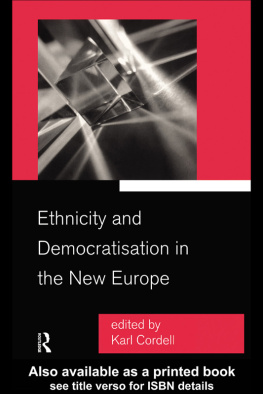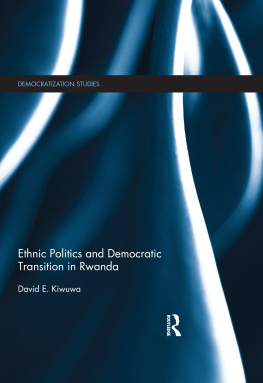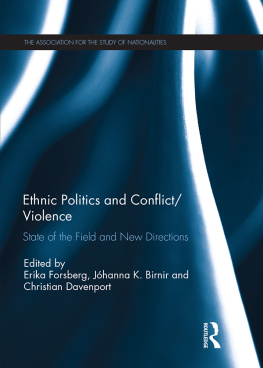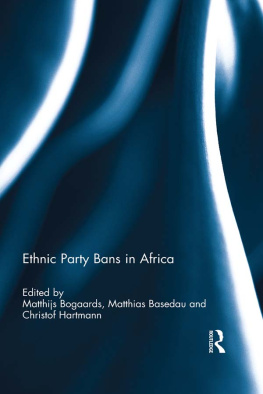Democratisation in the Himalayas
Democratisation is a formidable task in the Himalayan region owing to its immense cultural heterogeneity. The process of democratisation has accentuated ethnic competition, assertion of identity, and demand for ethnic homelands to protect, safeguard, and promote political and development interests of various groups.
This volume discusses competing interests, identity politics that permeates political formations, the transformations in the traditional forms of governance and their adaption to democratic institutions, the genesis and periodic eruptions of ethnic assertions, and attempts to resolve ethnic conflict. It shows how recent efforts at deepening democratic values and implementing social justice have been resisted and contested. The book argues that the play of ethnicity, the creation of political parties and interest groups, the emergence of social movements, and the voice of protest and opposition do not indicate a crisis in democracy but comprise the instruments by which the state is pushed towards reform, welfare, and inclusive politics, and is obliged to listen to the people.
Rich in ethnographic research, this volume will be useful to scholars and researchers of social and political anthropology, political studies, South Asian studies, Nepal and Himalayan studies, sociology, and development studies.
Vibha Arora is Associate Professor of Sociology and Social Anthropology at the Department of Humanities and Social Sciences, Indian Institute of Technology Delhi, India.
N. Jayaram is Visiting Professor at National Law School of India University, Bengaluru, India.
Nepal and Himalayan Studies
This series will bring the larger Nepal and the Himalayan region to the centre stage of academic analysis and explore critical questions that confront the region, ranging from society, culture and politics to economy and ecology. The books in the series will examine key themes concerning religion, ethnicity, language, identity, history, tradition, community, polity, democracy, as well as emerging issues regarding environment and development of this unique region.
For a full list of titles in this series, please visit www.routledge.com/Nepal-and-Himalayan-Studies/book-series/NHS
Nepali Diaspora in a Globalised Era
Edited by Tanka B. Subba and A. C. Sinha
Goddesses of Kathmandu Valley
Grace, rage, knowledge
Arun Gupto
The Himalayas and IndiaChina Relations
Devendra Nath Panigrahi
Democratisation in the Himalayas
Interests, Conflicts, and Negotiations
Edited by Vibha Arora and N. Jayaram
First published 2017
by Routledge
2 Park Square, Milton Park, Abingdon, Oxon OX14 4RN
and by Routledge
711 Third Avenue, New York, NY 10017
Routledge is an imprint of the Taylor & Francis Group, an informa business
2017 selection and editorial matter, Vibha Arora and N. Jayaram; individual chapters, the contributors
The right of Vibha Arora and N. Jayaram to be identified as the authors of the editorial material, and of the authors for their individual chapters, has been asserted in accordance with sections 77 and 78 of the Copyright, Designs and Patents Act 1988.
All rights reserved. No part of this book may be reprinted or reproduced or utilised in any form or by any electronic, mechanical, or other means, now known or hereafter invented, including photocopying and recording, or in any information storage or retrieval system, without permission in writing from the publishers.
Trademark notice: Product or corporate names may be trademarks or registered trademarks, and are used only for identification and explanation without intent to infringe.
British Library Cataloguing-in-Publication Data
A catalogue record for this book is available from the British Library
Library of Congress Cataloging-in-Publication Data
A catalog record has been requested for this book
ISBN: 978-1-138-24428-3 (hbk)
ISBN: 978-1-315-27698-4 (ebk)
Typeset in Galliard
by Apex CoVantage, LLC
To
Our respective families.
Contents
Vibha Arora is Associate Professor of Sociology and Social Anthropology at the Department of Humanities and Social Sciences, Indian Institute of Technology Delhi, India.
Subhadra Mitra Channa is Professor of Social Anthropology at the University of Delhi, India.
Debojyoti Das is Global Studies Associate at the Global Studies Centre, University of Sussex, United Kingdom.
Swargajyoti Gohain teaches Sociology and Anthropology in the Department of Humanities and Social Sciences at the Indian Institute of Technology Kanpur, India.
Ngamjahao Kipgen is Assistant Professor of Sociology at the Department of Humanities and Social Sciences, Indian Institute of Technology Guwahati, India.
Nilika Mehrotra is Professor of Social Anthropology at the Centre for the Study of Social Systems, Jawaharlal Nehru University, India.
Charu Sawhney is Research Associate in the Department of Sociology, University of Delhi, India.
Amanda Snellinger is an anthropologist with a focus on activism, youth, politics, and legal change in South Asia.
The young democratic regimes located in the fragile topography of the Himalayas show how challenging it is to sustain and foster democratisation. Democracies have to be constantly sustained, nurtured, and invigorated as a legitimate form of governance. The governments elected, contested, dissolved, or toppled in this region highlight the dynamics of democratic evolution. The encounter between procedural aspects of democracy and development aspiration emphasises the difficulties in fostering common ground and the different trajectories democracies can take. Predictably the deep connection between ecology, polity, and a socially heterogeneous population has taken a regional form, as is evident in the different case studies comprising this volume. The topographic fragility of the region and different natural hazards and disasters earthquakes, forest fires, cloudbursts, and flash floods that this region has suffered in the recent past have constantly tested the young democracies there.
Our first volume Routeing Democracy in the Himalayas: Experiments and Experiences (Routledge 2013) encouraged us to plan this second volume to fill gaps in existing literature and also showcase how young scholars are documenting the political encounters in the Himalayan amphitheatre. If the first volume was a beginning of our experimental journey into understanding how local conceptions are interacting with national and global waves of democratisation, this second volume both consolidates the legitimacy and enhances the seductive appeal of this undertaking. As co-editors we have benefitted from this critical engagement and scholarly exchange. We hope to have deepened and enriched the debate and kindled further academic interest in this region.
Compiling an acknowledgement list is always a daunting task; several people have helped us in manifold ways. First and foremost, we thank our contributors for their patience, as the volume took a little more time than we had anticipated due to unforeseen reasons. We thank the Indian Sociological Society for allowing us to republish two essays that were published in its official journal: Pure Democracy in New Nepal: Conceptions, Practices, and Anxieties by Amanda Snellinger (which earlier appeared as Democratic Form: Conceptions and Practices in the Making of New Nepal), Sociological Bulletin , 58(1), JanuaryApril 2009, pp. 4370, and Displacement from Kashmir: Gendered Responses by Charu Sawhney and Nilika Mehrotra, Sociological Bulletin , 62(1), JanuaryApril 2013, pp. 8399.

